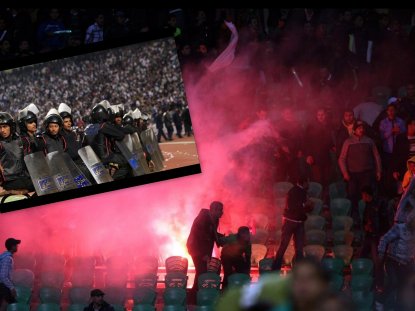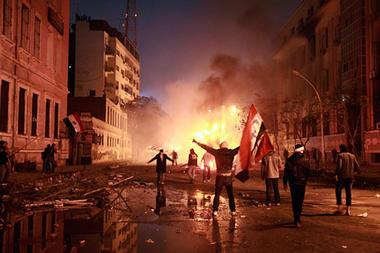
“Egyptians infuriated by the deaths of 74 people in soccer violence staged protests in central Cairo and clashed with the police forces, as the army-led government came under fire for failing to prevent the deadliest incident since the overthrow of Hosni Mubarak.”
Dr. Ashraf Ezzat / Cairo, Feb 4, 2012

For the third day in a row, Deadly clashes continue to rage in Egypt over football riots leaving 12 killed and more than 2500 wounded in street clashes over authorities’ failure to stop Port Said football violence.
State media reported renewed scuffles between members of the security forces encircling the building of the ministry of interior and demonstrators who included hardcore soccer fans, aka Ultras, known for confronting the police and who were on the frontlines of protests against the military throughout the last year.
The Ultras played a prominent role with anti-government activists in the uprising that toppled president Hosni Mubarak a year ago, and a spokesman on their behalf has suggested pro-Mubarak forces were behind the soccer incident, or at least complicit.
The soccer violence will likely strike news followers as most unfortunate and tragic accident, but for the supreme military council of armed forces of Egypt (SCAF), a council reluctant to relinquish power, it will definitely strike a different chord.
For a military institution that is supposed to hand over power to civilians by next July, after a monopoly of power for more than six decades, any incident that would allow chaos and insecurity to prevail will certainly be welcomed.
A stampede is an act of mass impulse among a crowd of people in which the crowd collectively begins running with no clear direction or purpose. But last Wednesday’s soccer violence that left 74 killed and at least 1,000 people injured in the Egyptian coastal city of Port Said when soccer fans invaded the pitch after local team al-Masry beat Cairo-based Al Ahli, has been no accidental stampede.
The fingers are once again pointing at the police’s complicity in the bloody incident as well as the overall instability and insecurity that has been afflicting the country since the fall of Mubarak.
The scenes and initial investigations proved all the gates to the football pitch were deliberately ordered open minutes before the end of the match, and also showed the police forces stood still and did almost nothing to prevent the disaster.

“It seems the whole thing had been planned beforehand.” said Mahmoud el-Sayed, one of the football players at Al-Ahly club (the most famous football club in Africa)
While a whole year has lapsed since the Egyptian revolution erupted, it is getting more and more obvious every day that toppling Mubarak was the easy part of the revolt and the real battle, if you like, that has been raging throughout the last year is between the will of the people and the mighty apparatus of the police and the military, who have practically been running the show in Egypt since 1952.
What happened in the stadium of Port Said, a continuation of the security vacuum policy, could only be explained as part of a plan by the military council and the interior ministry to push the country into chaos and force Egyptians to embrace military rule.
That fact that SCAF succeeded in securing parliamentary elections (completed in January 2012) across nine different governorates but were incapable of securing a football match where clashes were possible raises few legitimate doubts about the hidden motivations behind the soccer riots and the seriousness of the military to cede power to a civilian government as well.
Egypt’s ruling generals have put themselves on a collision course with the country’s new parliament after declaring that MPs will not have the final say over the drafting of a fresh constitution. Being referred to as “the guardian of constitutional legitimacy”, SCAF is pushing for a constitution draft that includes guiding principles for Egypt’s new constitution, but also, and most importantly, introduces amendments that would shield the military from civilian oversight.
SCAF is being pressured to hand over power to a civilian administration and a civilian president as soon as possible. But the top brass, refusing to get out of the scene empty handed, suggest the armed forces should have the final word on major policies even after a new president is elected.
But that is not likely to resonate well among the revolutionaries and political activists and will be the more reason for protests and violence to escalate on the Egyptian street, for the Arab spring has confirmed one thing: the army is not fit to govern – neither in Egypt nor in Syria or Yemen.
For more articles by Dr. Ashraf Ezzat visit his website
[youtube 6nlNpLw1HNs Egypt soccer violence]

Ashraf Ezzat is an Egyptian born in Cairo and based in Alexandria. He graduated from the faculty of Medicine at Alexandria University.
Keen not to be entirely consumed by the medical profession, Dr. Ezzat invests a lot of his time in research and writing. History of the ancient Near East and of Ancient Egypt has long been an area of special interest to him.
In his writings, he approaches ancient history not as some tales from the remote times but as a causative factor in our existing life; and to him, it’s as relevant and vibrant as the current moment.
In his research and writings, Dr. Ezzat is always on a quest trying to find out why the ancient wisdom had been obstructed and ancient spirituality diminished whereas the Judeo-Christian teachings and faith took hold and prospered.
Dr. Ezzat has written extensively in Arabic tackling many issues and topics in the field of Egyptology and comparative religion. He is the author of Egypt knew no Pharaohs nor Israelites.
He writes regularly at many well-known online websites such as Dissident Voice and What Really Happened.
Dr. Ezzat is also an independent filmmaker. His debut film was back in 2011 The Annals of Egypt Revolution and in 2012 he made Tale of Osiris a short animation for children.
In 2013 his short The Pyramids: story of creation was screened at many international film festivals in Europe. And he is working now on his first documentary “Egypt knew no Pharaohs nor Israelites”.
ATTENTION READERS
We See The World From All Sides and Want YOU To Be Fully InformedIn fact, intentional disinformation is a disgraceful scourge in media today. So to assuage any possible errant incorrect information posted herein, we strongly encourage you to seek corroboration from other non-VT sources before forming an educated opinion.
About VT - Policies & Disclosures - Comment Policy



